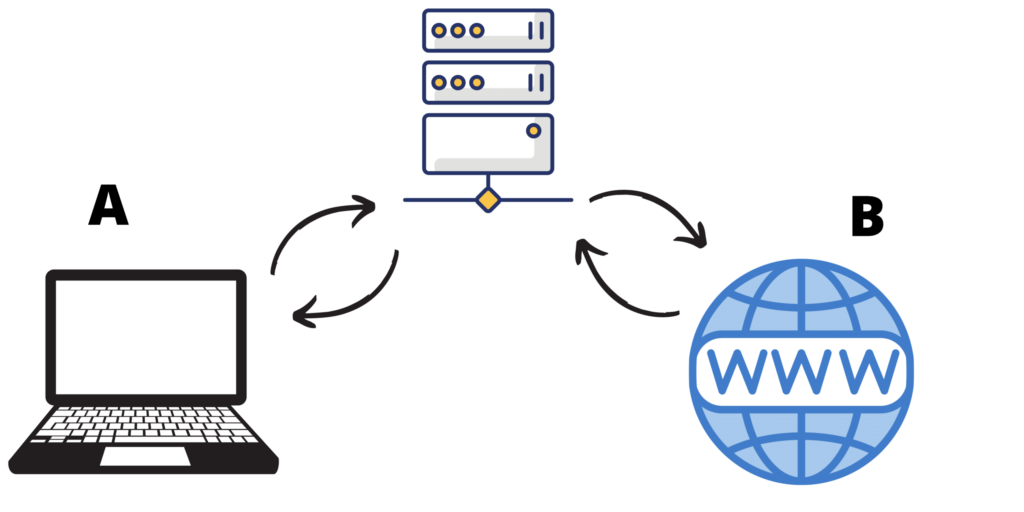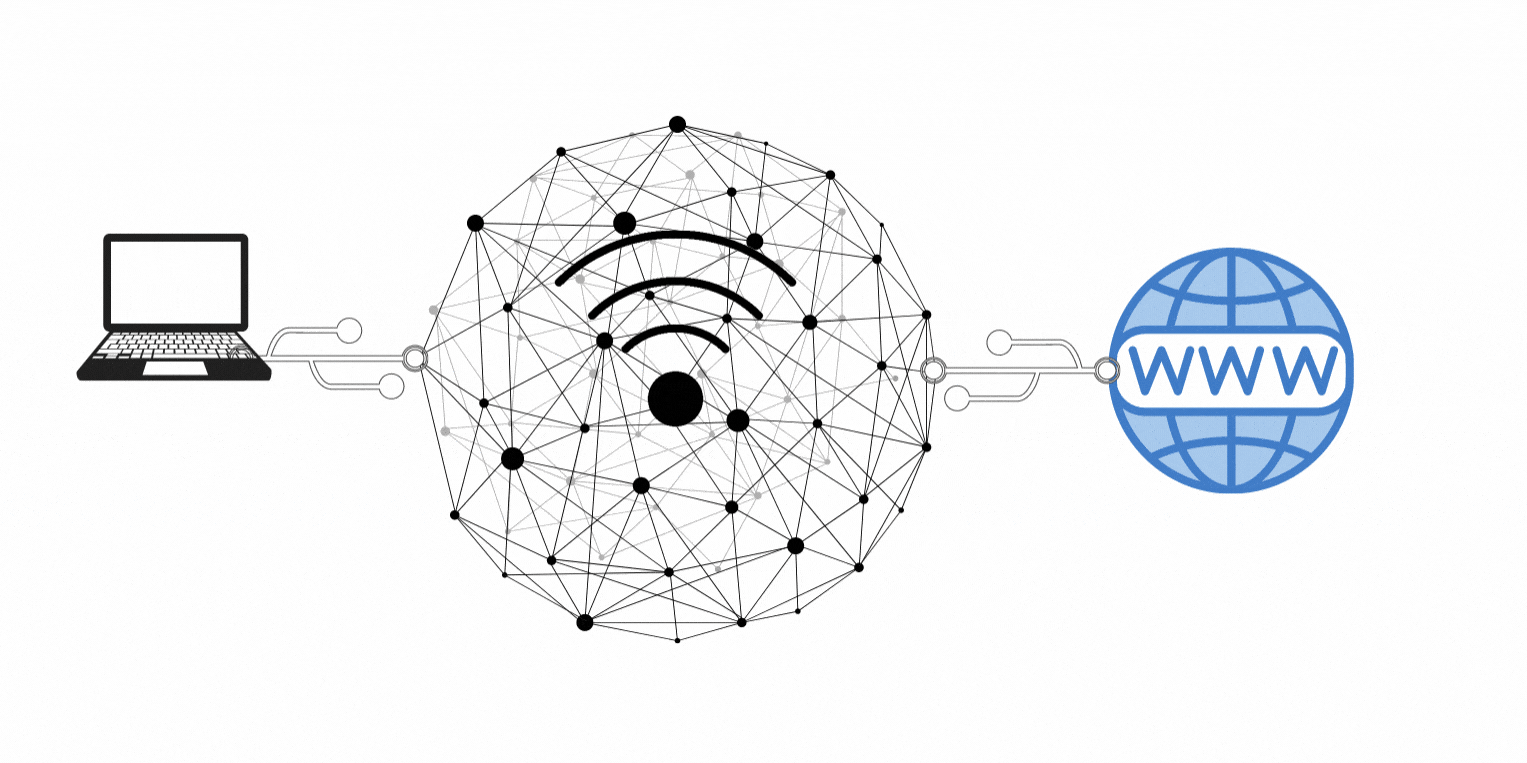Backconnect proxies and rotating proxies are one and the same.
I could just leave you with the hyperlink and call it a day, but I need to rank for keywords.
And vent a little.
If you’re like me and get a little OCD over definitions and crave the relief that untangling terms of emergent technology provides..
stick around.
You can run some serious circles trying to figure out whether you need backconnect or rotating residential proxies.
So what is a backconnect proxy?
First a little recap of what a proxy is. A proxy is another computer – could be a PC, cloud server, mobile phone, anything with an IP address – that you use to access the internet.

Instead of going from your computer directly to the internet (point A to point B), your requests go through a proxy before reaching the internet. And then the information comes back to you the same way it came – via proxy.
It’s like when you order something online and have to give your mailing address in order to receive the package. In this case, a proxy would be like a re-shipper.
Why would you do that?
Well it hides your IP address. When you go through a proxy, you borrow it’s identity to send and receive information.
It’s pretty limited though. You can hide your IP address, and even access the web from anywhere in the world, but it’s not going to provide the kind of superpowers that enhance web scrapers, create multiple stealth accounts, sneaker bot, aggregate prices, and the like.
This is where the backconnect comes in. It’s like one proxy that connects you to thousands of others.

In order to work, a backconnect proxy needs to exist within a pool of proxies. You connect to one proxy after another for every request you make, or after a certain amount time (up to thirty minutes). You connect to the internet as usual – but your IP address changes all the time.
Sound familiar?
Yeah. Well – that’s how you’d describe rotating proxies too.
Rotating residential proxies vs backconnect proxies
- Whenever someone talks about backconnect proxies, they usually mean the residential type.
- Residential proxies are either rotating or static. (Backconnect or not)
The problem is that static residential proxies can’t truly exist – they all rotate to some extent. The closest thing to static residential proxies are ISP proxies, but that’s a whole other bag of cats.
So basically, all rotating residential proxies are backconnect, but not all backconnect are residential.
The other type of backconnect proxies are rotating datacenter proxies. You can make functional backconnect datacenter proxies simply by copy-and-pasting a list of datacenter proxies into a proxy rotator.
It’s important to discern between datacenter and residential backconnect proxies. Most of the time, backconnect is synonymous with rotating residential proxies.
I think we can all agree that ‘backconnect’ creates unnecessary ambiguity, and ‘rotating residential’ is more precise.
How do backconnect proxies work?
Often when you send too many requests from one IP address, you’ll get blocked by the target website. Only bots can make that amount of ruckus and websites are more likely to experience negative impacts rather than any benefit from permitting bots in their domain.

So if you plan to use any automated software tools, you need to be able to surpass rate limits without getting blocked. Backconnect proxies allow you to send each request from a different IP address. That way, you can make many more requests without detection.
This proxy rotation is done by a proxy management tool. On a small scale, you can manage proxies from a browser extension like FoxyProxy or SwitchyOmega. On a larger scale, a team of proxy experts like IPburger’s manage networks of residential proxies all over the world.
When do you need backconnect proxies?
Whenever you need to make a lot of requests from websites. As mentioned earlier, it’s not long before a website will give you the boot for making too many requests. So if you are mining data with a web scraper, you need proxy rotation.
Pros and cons of backconnect proxies
The advantages are quite extraordinary when compared to regular proxies.
Time efficient
Especially if you buy a package from a proxy vendor like IPburger, you won’t spend any time fiddling around with proxy management systems. You can simply set your locations, rotation settings and get to work.
Eliminate request limits
Free from rate limits, you’re able to send as many requests as you’d like without having to worry about blocks. Even if proxies are blocked, you wouldn’t notice because you can continue your tasks while the proxies seamlessly rotate.
This is ideal for web scraping, but it’s still best practice to respect rate limits. You can get an incredible amount of work done without testing the boundaries.
Increase anonymity
A regular proxy already hides your address, but with backconnect proxies your IP address changes all the time. If you stick to backconnect residential proxies, then websites cannot tell you apart from other real users. Whereas you’ll have more issues with backconnect datacenter proxies because it’s easy to see your connection isn’t coming from a residential user.
The only real disadvantages to backconnect proxies are superficial.
Cost money
Just like any service, they have value worth paying for. While scrounging up a bunch of free datacenter proxies may seem to be cost efficient, they’ll burn you in the long run.
If you’re just web scraping, the cheapest option is to manage a few data center proxies on your own. This has drawbacks though. You won’t be able to scrape as much or as quickly, and you’ll keep having to replace burned proxies because datacenter proxies are frequently blacklisted.
Slow at times
This again depends on the type of backconnect proxies you use. Residential proxies are slower at times because you’re limited by the proxy owner’s internet speed. Datacenter proxies on the other hand, will always be fast. One way to increase your speeds is to set your proxy location near to your target website.
So if you are scraping the web in the US, you would select a pool of US proxies. The same goes for sneaker bots, but you can zoom in even closer to the major shoe retailer servers that may be located in New York, Chicago.. residential proxies exist wherever you need them.
Price aggregation
Price aggregation requires you to get a snapshot of product price tags across many websites across the globe. It’s only possible to do this undetected with rotating residential proxies, or residential backconnect proxies. They allow you to see the local prices around the world and rotate proxies within each location.
Looking for Proxies?
Unless the semantic ambiguity ruffles your feathers, it really doesn’t matter whether you want to call them backconnect or rotating proxies. What really makes the difference is whether they are datacenter or residential proxies. Backconnect proxies, which tend to be of the residential sort, are powerful and necessary tools in data mining, online retail, and account management.
Don’t settle for free or cheap proxies as they will give you more problems than solutions. It’s better to find a reputable vendor who can provide a vast source of rotating residential proxies. That way, you can focus on your work and leave the proxy management to professionals.


